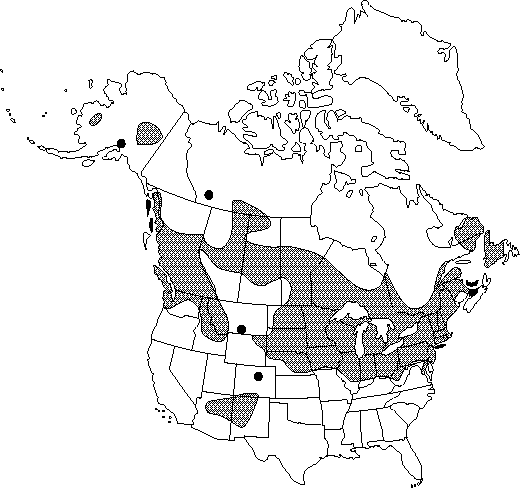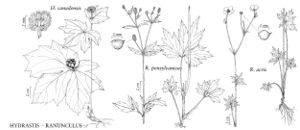Difference between revisions of "Ranunculus pensylvanicus"
Suppl. Pl., 272. 1782.
imported>Volume Importer |
GeoffLevin (talk | contribs) m (Fixed Nfld. and Labr. distribution to match map in printed version.) |
||
| Line 30: | Line 30: | ||
|habitat=Stream banks, bogs, moist clearings, depressions in woodlands | |habitat=Stream banks, bogs, moist clearings, depressions in woodlands | ||
|elevation=0-1700 m | |elevation=0-1700 m | ||
| − | |distribution=Alta.;B.C.;Man.;N.B.;Nfld. and Labr. | + | |distribution=Alta.;B.C.;Man.;N.B.;Nfld. and Labr.;N.W.T.;N.S.;Ont.;P.E.I.;Que.;Sask.;Alaska;Ariz.;Colo.;Conn.;Del.;D.C.;Idaho;Ill.;Ind.;Iowa;Maine;Md.;Mass.;Mich.;Minn.;Mont.;Nebr.;N.H.;N.J.;N.Mex.;N.Y.;N.Dak.;Ohio;Pa.;R.I.;S.Dak.;Vt.;Wash.;W.Va.;Wis.;Wyo. |
|discussion=<p>Ojibwa tribes used <i>Ranunculus pensylvanicus</i> as a hunting medicine; the Potawatomi used it as an astringent for miscellaneous diseases (D. E. Moerman 1986).</p> | |discussion=<p>Ojibwa tribes used <i>Ranunculus pensylvanicus</i> as a hunting medicine; the Potawatomi used it as an astringent for miscellaneous diseases (D. E. Moerman 1986).</p> | ||
|tables= | |tables= | ||
| Line 49: | Line 49: | ||
|habitat=Stream banks, bogs, moist clearings, depressions in woodlands | |habitat=Stream banks, bogs, moist clearings, depressions in woodlands | ||
|elevation=0-1700 m | |elevation=0-1700 m | ||
| − | |distribution=Alta.;B.C.;Man.;N.B.;Nfld. and Labr. | + | |distribution=Alta.;B.C.;Man.;N.B.;Nfld. and Labr.;N.W.T.;N.S.;Ont.;P.E.I.;Que.;Sask.;Alaska;Ariz.;Colo.;Conn.;Del.;D.C.;Idaho;Ill.;Ind.;Iowa;Maine;Md.;Mass.;Mich.;Minn.;Mont.;Nebr.;N.H.;N.J.;N.Mex.;N.Y.;N.Dak.;Ohio;Pa.;R.I.;S.Dak.;Vt.;Wash.;W.Va.;Wis.;Wyo. |
|reference=None | |reference=None | ||
|publication title=Suppl. Pl., | |publication title=Suppl. Pl., | ||
Latest revision as of 16:08, 29 February 2024
Stems erect, never rooting nodally, hispid, base not bulbous. Roots never tuberous. Basal leaf blades broadly cordate in outline, 3-foliolate, 1.6-7 × 3-9 cm, leaflets cleft, usually deeply so, ultimate segments narrowly elliptic, margins toothed, apex acute. Flowers: receptacle hirsute; sepals reflexed ca. 1 mm above base, 3-5 × 1.5-2 mm, ± hispid; petals 5, yellow, 2-4 × 1-2.5 mm. Heads of achenes cylindric, 9-12 × 5-7 mm; achenes 1.8-2.8 × 1.6-2 mm, glabrous, margin forming narrow rib 0.1-0.2 mm wide; beak persistent, broadly lanceolate or nearly deltate, straight or nearly so, 0.6-0.8 mm. 2n = 16.
Phenology: Flowering late spring–summer (Jun–Aug).
Habitat: Stream banks, bogs, moist clearings, depressions in woodlands
Elevation: 0-1700 m
Distribution

Alta., B.C., Man., N.B., Nfld. and Labr., N.W.T., N.S., Ont., P.E.I., Que., Sask., Alaska, Ariz., Colo., Conn., Del., D.C., Idaho, Ill., Ind., Iowa, Maine, Md., Mass., Mich., Minn., Mont., Nebr., N.H., N.J., N.Mex., N.Y., N.Dak., Ohio, Pa., R.I., S.Dak., Vt., Wash., W.Va., Wis., Wyo.
Discussion
Ojibwa tribes used Ranunculus pensylvanicus as a hunting medicine; the Potawatomi used it as an astringent for miscellaneous diseases (D. E. Moerman 1986).
Selected References
None.
